Oklahoma’s Promise (Fingers Crossed)
Oklahoma’s Promise (Fingers Crossed)
In the summer of 2004, on my first day of work for the Oklahoma State Regents for Higher Education, I completed my HR paperwork and walked to my cubicle where I found a stack of paper about one foot tall on my desk. They were high school transcripts and OHLAP verification forms. As a high school principal just a few weeks before, I had been responsible for reviewing transcripts for OHLAP, signing them, and sending them off somewhere. Now I was somewhere, reviewing those transcripts through a different lens.
Here is the description of the program (which has since been renamed Oklahoma’s Promise) from the State Regents’ website:
Oklahoma’s Promise allows eighth-, ninth- or 10th-grade students from families with an income of $55,000 or less to earn a college tuition scholarship. Students must also meet academic and conduct requirements in high school.
Created in 1992 by the Legislature to help more Oklahoma families send their children to college, Oklahoma’s Promise was originally designated as the Oklahoma Higher Learning Access Program. The program is administered by the Oklahoma State Regents for Higher Education.
Oklahoma’s Promise has been an incredibly successful program. The State Regents publish a statistical report every year that provides a wealth of information about enrollment, completion, and so much more. For the 2019-20 school year, 75% of high school students who signed up for the program, completed the academic requirements for it. Compare that to the graduating class of 1996, in which only 39.6% of students who signed up completed it. Oklahoma’s Promise, if nothing else, encourages students from low-income families to complete high school having completed more college-bound courses. That alone makes it a public program with longitudinal data to prove its efficacy.
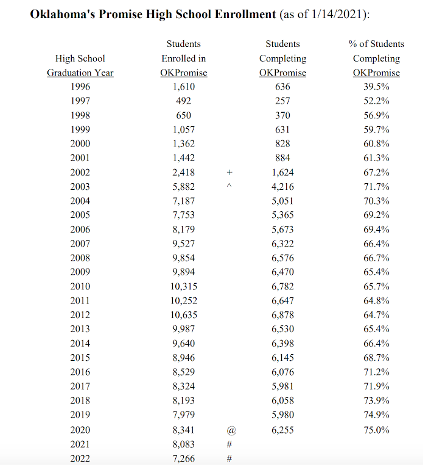
Now, for some reason, the Oklahoma Legislature wants to change it. Senate Bill 639, authored by Adam Pugh (R – Edmond), makes two significant changes to Oklahoma’s Promise. I like one, and I hate the other so much that I have flames coming out of my head.

The good change would be an expansion of Oklahoma’s Promise to include training for programs identified by the Department of Commerce as “critical occupation areas.” It makes sense. Not every high school graduate wants to go to college, nor do they need to. If we can help people gain qualifications to begin a career, we should. Again, it’s good public policy. Once we have 25 years of data on this change (as we do with Oklahoma’s Promise), I bet the investment will prove worthwhile.
The bad change – and the word bad is really not strong enough here – is a clawback provision that would require students who don’t complete their program to pay the state back. I’m curious here…when we provide tax credits to companies that in turn lay off employees, do we ask them to repay the state? Nevermind. I’m going off on a tangent.
When questioned on the floor of the Senate about this provision, Pugh offered the following defense:
“We have got to stop with the bigotry of low expectations in this building.”
Ahh, the bigotry of low expectations. It was a garbage line in 2000 when W was pitching his vision for public education, and it’s a garbage line now. It’s also completely contradicted by fact.
I still know some of the people who work in the Oklahoma’s Promise office at the State Regents. They have a passion for the program and dedication to the students who benefit from it. They also have receipts. Here are a few more data points from their annual report.
For one thing, Oklahoma’s Promise students have higher high school GPAs than students who aren’t enrolled in the program. This is likely due to the well-understood importance of having students set goals and regularly discuss them with the adults in their lives. It also speaks to the importance of school counselors and strong guidance programs.
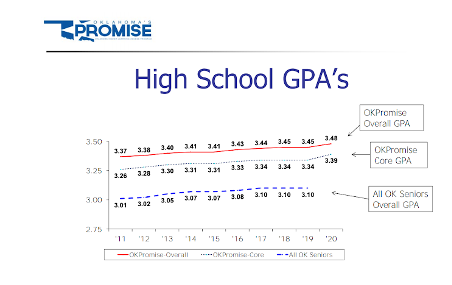
They have higher ACT scores.
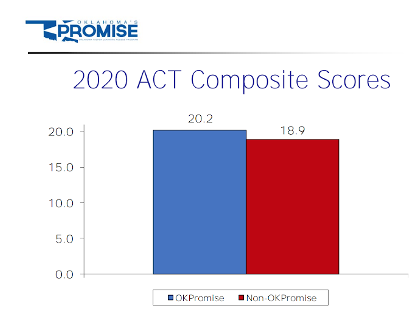
They have higher college-going rates…
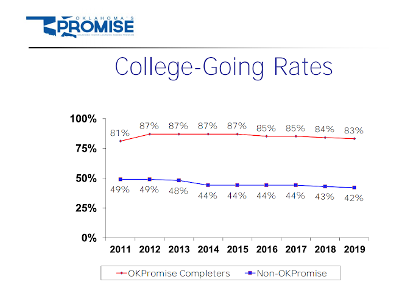
…and lower college remediation rates.
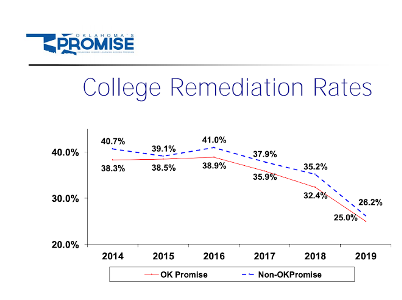
Oklahoma’s Promise students have higher college GPAs…
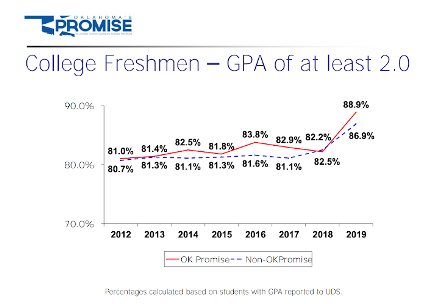
… as well as better persistence rates into their sophomore year…
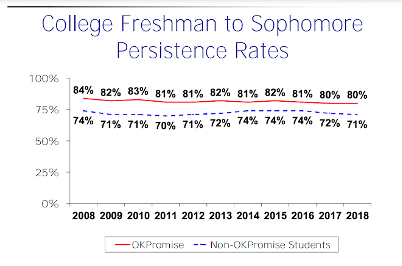
… and degree completion…
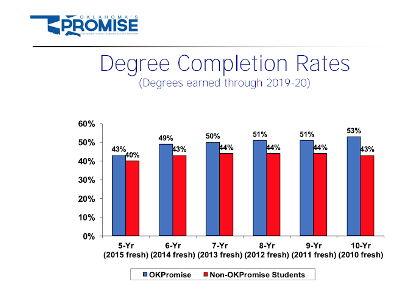
… and postgraduate employment.
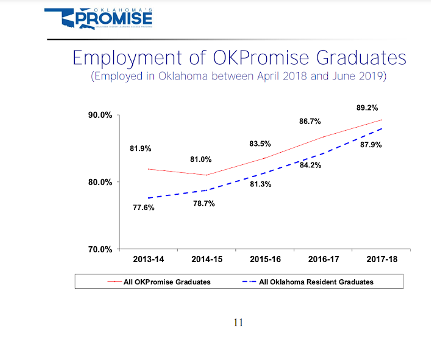
Let’s be clear. Nobody has low expectations for the Oklahoma’s Promise financial aid recipients. They’re Oklahoma’s most reliable college students. It seems to me that they keep their promises better than the Oklahoma Legislature does.
College is hard for many people, and for many reasons. An endless number of scenarios can complicate the time span between a student’s matriculation and anticipated graduation. Many of these are out of their control. We need to remember that as Oklahoma taxpayers, we subsidize the education of all students at our public institutions of higher education. Senate Bill 639 would only punish the poor ones who don’t finish.
If you believe that people with means (read: privilege) are the only ones who should have the opportunity to advance themselves, maybe you support this bill. On the other hand, if you believe that the investment Oklahomans have made for a quarter century in the education of students who might otherwise miss out is worth it in spite of the ones who don’t reach the finish line, you should fight this bill with every fiber of your being. We can’t tell people to try, but we’ll punish you if you fail.
Please contact whoever represents you in the House and ask them to vote against SB 639. Or at least ask them to fix it. Leave the good part in. Take the bad part out.

My son is autistic. It took him seven years, but by golly, he’s graduating from Rose State in May. Oklahoma’s Promise really helped us. Just because a student doesn’t finish a degree immediately doesn’t mean they won’t. Life happens. They should not have to pay back these funds. Any education they acquired with them will help them in their adult life.
LikeLike